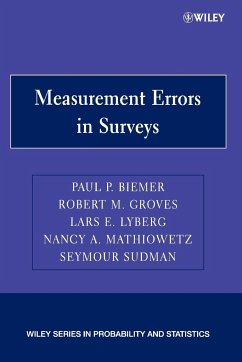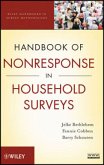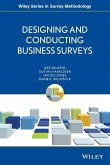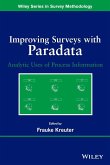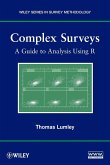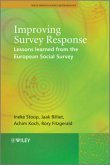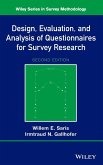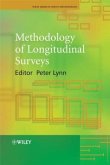Measurement Errors in Surveys
Ed. by Paul P. Biemer, Robert M. Groves, Lars E. Lyberg et al.
Measurement Errors in Surveys
Ed. by Paul P. Biemer, Robert M. Groves, Lars E. Lyberg et al.
- Broschiertes Buch
- Merkliste
- Auf die Merkliste
- Bewerten Bewerten
- Teilen
- Produkt teilen
- Produkterinnerung
- Produkterinnerung
WILEY-INTERSCIENCE PAPERBACK SERIES The Wiley-Interscience Paperback Series consists of selected books that have been made more accessible to consumers in an effort to increase global appeal and general circulation. With these new unabridged softcover volumes, Wiley hopes to extend the lives of these works by making them available to future generations of statisticians, mathematicians, and scientists.
"This book will be an aid to survey statisticians and to research workers who must work with survey data." -Short Book Reviews, International Statistical Institute
Measurement Errors in…mehr
Andere Kunden interessierten sich auch für
![Handbook of Nonresponse in Household Surveys Handbook of Nonresponse in Household Surveys]() Jelke BethlehemHandbook of Nonresponse in Household Surveys180,99 €
Jelke BethlehemHandbook of Nonresponse in Household Surveys180,99 €![Designing and Conducting Business Surveys Designing and Conducting Business Surveys]() Ger SnijkersDesigning and Conducting Business Surveys91,99 €
Ger SnijkersDesigning and Conducting Business Surveys91,99 €![Improving Surveys with Paradata Improving Surveys with Paradata]() F KreuterImproving Surveys with Paradata80,99 €
F KreuterImproving Surveys with Paradata80,99 €![Complex Surveys Complex Surveys]() Thomas S. LumleyComplex Surveys105,99 €
Thomas S. LumleyComplex Surveys105,99 €![Improving Survey Response Improving Survey Response]() Ineke StoopImproving Survey Response109,99 €
Ineke StoopImproving Survey Response109,99 €![Design of Questionnaires 2E Design of Questionnaires 2E]() Willem E. SarisDesign of Questionnaires 2E87,99 €
Willem E. SarisDesign of Questionnaires 2E87,99 €![Methodology of Longitudinal Surveys Methodology of Longitudinal Surveys]() Methodology of Longitudinal Surveys133,99 €
Methodology of Longitudinal Surveys133,99 €-
-
-
WILEY-INTERSCIENCE PAPERBACK SERIES
The Wiley-Interscience Paperback Series consists of selected books that have been made more accessible to consumers in an effort to increase global appeal and general circulation. With these new unabridged softcover volumes, Wiley hopes to extend the lives of these works by making them available to future generations of statisticians, mathematicians, and scientists.
"This book will be an aid to survey statisticians and to research workers who must work with survey data."
-Short Book Reviews, International Statistical Institute
Measurement Errors in Surveys documents the current state of the field, reports new research findings, and promotes interdisciplinary exchanges in modeling, assessing, and reducing measurement errors in surveys. Providing a fundamental approach to measurement errors, the book features sections on the questionnaire, respondents and responses, interviewers and other means of data collection, the respondent-interviewer relationship, and the effects of measurement errors on estimation and data analysis.
The Wiley-Interscience Paperback Series consists of selected books that have been made more accessible to consumers in an effort to increase global appeal and general circulation. With these new unabridged softcover volumes, Wiley hopes to extend the lives of these works by making them available to future generations of statisticians, mathematicians, and scientists.
"This book will be an aid to survey statisticians and to research workers who must work with survey data."
-Short Book Reviews, International Statistical Institute
Measurement Errors in Surveys documents the current state of the field, reports new research findings, and promotes interdisciplinary exchanges in modeling, assessing, and reducing measurement errors in surveys. Providing a fundamental approach to measurement errors, the book features sections on the questionnaire, respondents and responses, interviewers and other means of data collection, the respondent-interviewer relationship, and the effects of measurement errors on estimation and data analysis.
Produktdetails
- Produktdetails
- Wiley Series in Probability and Statistics
- Verlag: Wiley & Sons
- Seitenzahl: 804
- Erscheinungstermin: 12. August 2013
- Englisch
- Abmessung: 234mm x 156mm x 43mm
- Gewicht: 985g
- ISBN-13: 9780471692805
- ISBN-10: 0471692808
- Artikelnr.: 13079444
- Herstellerkennzeichnung
- Libri GmbH
- Europaallee 1
- 36244 Bad Hersfeld
- gpsr@libri.de
- Wiley Series in Probability and Statistics
- Verlag: Wiley & Sons
- Seitenzahl: 804
- Erscheinungstermin: 12. August 2013
- Englisch
- Abmessung: 234mm x 156mm x 43mm
- Gewicht: 985g
- ISBN-13: 9780471692805
- ISBN-10: 0471692808
- Artikelnr.: 13079444
- Herstellerkennzeichnung
- Libri GmbH
- Europaallee 1
- 36244 Bad Hersfeld
- gpsr@libri.de
PAUL P. BIEMER, PhD, is Chief Scientist at the Research Triangle Institute in North Carolina. ROBERT M. GROVES, PhD, is Program Director (Senior Research Scientist) in the Survey Research Center of the University of Michigan, where he also serves as Director in the Institute for Social Research and Professor of Sociology. LARS E. LYBERG, PhD, is Chief Scientist at Statistics Sweden in Stockholm. NANCY A. MATHIOWETZ, PhD, is Special Assistant Director for Statistical Design, Methodology, and Standards at the U.S. Bureau of the Census. SEYMOUR SUDMAN, PhD, is the Walter A. Stellner Professor of Marketing and Deputy Director of the Survey Research Laboratory at the University of Illinois, Urbana-Champaign.
Preface.
Introduction (W. Kruskal).
1. Measurement Error Across Disciplines (R. Groves).
SECTION A: THE QUESTIONAIRE.
2. The Current Status of Questionnaire Design (N. Bradburn & S. Sudman).
3. Response Alternatives: The Impact of Their Choice and Presentation Order
(N. Schwarz & H. Hippler).
4. Context Effects in the General Social Survey (T. Smith).
5. Mode Effects of Cognitively Designed Recall Questions: A Comparison of
Answers to Telephone and Mail Surveys (D. Dillman & J. Tarnai).
6. Nonexperimental Research on Question Wording Effects: A Contribution to
Solving the Generalizability Problem (N. Molenaar).
7. Measurement Errors in Business Surveys (S. Dutka & L. Frankel).
SECTION B: RESPONDENTS AND RESPONSES.
8. Recall Error: Sources and Bias Reduction Techniques (D. Eisenhower, et
al.).
9. Measurement Effects in Self vs. Proxy Response to Survey Questions: An
Information-Processing Perspective (J. Blair, et al.).
10. An Alternative Approach to Obtaining Personal History Data (B. Means,
et al.).
11. The Item Count Technique as a Method of Indirect Questioning: A Review
of Its Development and a Case Study Application (J. Droitcour, et al.).
12. Toward a Response Model in Establishment Surveys (W. Edwards & D.
Cantor).
SECTION C: INTERVIEWERS AND OTHER MEANS OF DATA COLLECTION.
13. Data Collection Methods and Measurement Error: An Overview (L. Lyberg &
D. Kasprzyk).
14. Reducing Inte5rviewer-Related Error Through Interviewer Training,
Supervision, and Other Means (F. Fowler).
15. The Design and Analysis of Reinterview: An Overview (G. Forsman & I.
Schreiner).
16. Expenditure Diary Surveys and Their Associated Errors (A. Silberstein &
S. Scott).
17. A Review of Errors of Direct Observation in Crop Yield Surveys (R.
Fecso).
18. Measurement Error in Continuing Surveys of the Grocery Retail Trade
Using Electronic Data Collection Methods (J. Donmyer, et al.).
SECTION D: MEASUREMENT ERRORS IN THE INTERVIEW PROCESS.
19. Conversation with a Purpose-or Conversation? Interaction in the
Standardized Interview (N. Schaeffer).
20. Cognitive Laboratory Methods: A Taxonomy (B. Forsyth & J. Lessler).
21. Studying Respondent-Interviewer Interaction: The Relationship Between
Interviewing Style, Interviewer Behavior, and Response Behavior (J. van der
Zouwen, et al.).
22. The Effect of Interviewer and Respondent Characteristics on the Quality
of Survey Data: A Multilevel Model (J. Hox, et al.).
23. Interviewer, Respondent, and Regional Office Effects on Response
Variance: A Statistical Decomposition (D. Hill).
SECTION E: MODELING MEASUREMENT ERRORS AND THEIR EFFECTS ON ESTIMATION AND
DATA ANALYSIS.
24. Approaches to the Modeling of Measurement Errors (P. Biemer & L.
Stokes).
25. A Mixed Model for Analyzing Measurement Errors for Dichotomous
Variables (J. Pannekoek).
26. Models for Memory Effects in Count Data (P. van Dosselaar).
27. Simple Response Variance: Estimation and Determinants (C.
O'Muircheartaigh).
28. Evaluation of Measurement Instruments Using a Structural Modeling
Approach (W. Saris & F. Andrews).
29. A Path Analysis of Cross-National Data Taking Measurement Errors Into
Account (I. Munck).
30. Regression Estimation in the Presence of Measurement Error (W. Fuller).
31. Chi-Squared Tests with Complex Survey Data Subject to Misclassification
Error (J. Rao & D. Thomas).
32. The Effect of Measurement Error on Event History Analysis (D. Holt, et
al.).
References.
Index.
Introduction (W. Kruskal).
1. Measurement Error Across Disciplines (R. Groves).
SECTION A: THE QUESTIONAIRE.
2. The Current Status of Questionnaire Design (N. Bradburn & S. Sudman).
3. Response Alternatives: The Impact of Their Choice and Presentation Order
(N. Schwarz & H. Hippler).
4. Context Effects in the General Social Survey (T. Smith).
5. Mode Effects of Cognitively Designed Recall Questions: A Comparison of
Answers to Telephone and Mail Surveys (D. Dillman & J. Tarnai).
6. Nonexperimental Research on Question Wording Effects: A Contribution to
Solving the Generalizability Problem (N. Molenaar).
7. Measurement Errors in Business Surveys (S. Dutka & L. Frankel).
SECTION B: RESPONDENTS AND RESPONSES.
8. Recall Error: Sources and Bias Reduction Techniques (D. Eisenhower, et
al.).
9. Measurement Effects in Self vs. Proxy Response to Survey Questions: An
Information-Processing Perspective (J. Blair, et al.).
10. An Alternative Approach to Obtaining Personal History Data (B. Means,
et al.).
11. The Item Count Technique as a Method of Indirect Questioning: A Review
of Its Development and a Case Study Application (J. Droitcour, et al.).
12. Toward a Response Model in Establishment Surveys (W. Edwards & D.
Cantor).
SECTION C: INTERVIEWERS AND OTHER MEANS OF DATA COLLECTION.
13. Data Collection Methods and Measurement Error: An Overview (L. Lyberg &
D. Kasprzyk).
14. Reducing Inte5rviewer-Related Error Through Interviewer Training,
Supervision, and Other Means (F. Fowler).
15. The Design and Analysis of Reinterview: An Overview (G. Forsman & I.
Schreiner).
16. Expenditure Diary Surveys and Their Associated Errors (A. Silberstein &
S. Scott).
17. A Review of Errors of Direct Observation in Crop Yield Surveys (R.
Fecso).
18. Measurement Error in Continuing Surveys of the Grocery Retail Trade
Using Electronic Data Collection Methods (J. Donmyer, et al.).
SECTION D: MEASUREMENT ERRORS IN THE INTERVIEW PROCESS.
19. Conversation with a Purpose-or Conversation? Interaction in the
Standardized Interview (N. Schaeffer).
20. Cognitive Laboratory Methods: A Taxonomy (B. Forsyth & J. Lessler).
21. Studying Respondent-Interviewer Interaction: The Relationship Between
Interviewing Style, Interviewer Behavior, and Response Behavior (J. van der
Zouwen, et al.).
22. The Effect of Interviewer and Respondent Characteristics on the Quality
of Survey Data: A Multilevel Model (J. Hox, et al.).
23. Interviewer, Respondent, and Regional Office Effects on Response
Variance: A Statistical Decomposition (D. Hill).
SECTION E: MODELING MEASUREMENT ERRORS AND THEIR EFFECTS ON ESTIMATION AND
DATA ANALYSIS.
24. Approaches to the Modeling of Measurement Errors (P. Biemer & L.
Stokes).
25. A Mixed Model for Analyzing Measurement Errors for Dichotomous
Variables (J. Pannekoek).
26. Models for Memory Effects in Count Data (P. van Dosselaar).
27. Simple Response Variance: Estimation and Determinants (C.
O'Muircheartaigh).
28. Evaluation of Measurement Instruments Using a Structural Modeling
Approach (W. Saris & F. Andrews).
29. A Path Analysis of Cross-National Data Taking Measurement Errors Into
Account (I. Munck).
30. Regression Estimation in the Presence of Measurement Error (W. Fuller).
31. Chi-Squared Tests with Complex Survey Data Subject to Misclassification
Error (J. Rao & D. Thomas).
32. The Effect of Measurement Error on Event History Analysis (D. Holt, et
al.).
References.
Index.
Preface.
Introduction (W. Kruskal).
1. Measurement Error Across Disciplines (R. Groves).
SECTION A: THE QUESTIONAIRE.
2. The Current Status of Questionnaire Design (N. Bradburn & S. Sudman).
3. Response Alternatives: The Impact of Their Choice and Presentation Order
(N. Schwarz & H. Hippler).
4. Context Effects in the General Social Survey (T. Smith).
5. Mode Effects of Cognitively Designed Recall Questions: A Comparison of
Answers to Telephone and Mail Surveys (D. Dillman & J. Tarnai).
6. Nonexperimental Research on Question Wording Effects: A Contribution to
Solving the Generalizability Problem (N. Molenaar).
7. Measurement Errors in Business Surveys (S. Dutka & L. Frankel).
SECTION B: RESPONDENTS AND RESPONSES.
8. Recall Error: Sources and Bias Reduction Techniques (D. Eisenhower, et
al.).
9. Measurement Effects in Self vs. Proxy Response to Survey Questions: An
Information-Processing Perspective (J. Blair, et al.).
10. An Alternative Approach to Obtaining Personal History Data (B. Means,
et al.).
11. The Item Count Technique as a Method of Indirect Questioning: A Review
of Its Development and a Case Study Application (J. Droitcour, et al.).
12. Toward a Response Model in Establishment Surveys (W. Edwards & D.
Cantor).
SECTION C: INTERVIEWERS AND OTHER MEANS OF DATA COLLECTION.
13. Data Collection Methods and Measurement Error: An Overview (L. Lyberg &
D. Kasprzyk).
14. Reducing Inte5rviewer-Related Error Through Interviewer Training,
Supervision, and Other Means (F. Fowler).
15. The Design and Analysis of Reinterview: An Overview (G. Forsman & I.
Schreiner).
16. Expenditure Diary Surveys and Their Associated Errors (A. Silberstein &
S. Scott).
17. A Review of Errors of Direct Observation in Crop Yield Surveys (R.
Fecso).
18. Measurement Error in Continuing Surveys of the Grocery Retail Trade
Using Electronic Data Collection Methods (J. Donmyer, et al.).
SECTION D: MEASUREMENT ERRORS IN THE INTERVIEW PROCESS.
19. Conversation with a Purpose-or Conversation? Interaction in the
Standardized Interview (N. Schaeffer).
20. Cognitive Laboratory Methods: A Taxonomy (B. Forsyth & J. Lessler).
21. Studying Respondent-Interviewer Interaction: The Relationship Between
Interviewing Style, Interviewer Behavior, and Response Behavior (J. van der
Zouwen, et al.).
22. The Effect of Interviewer and Respondent Characteristics on the Quality
of Survey Data: A Multilevel Model (J. Hox, et al.).
23. Interviewer, Respondent, and Regional Office Effects on Response
Variance: A Statistical Decomposition (D. Hill).
SECTION E: MODELING MEASUREMENT ERRORS AND THEIR EFFECTS ON ESTIMATION AND
DATA ANALYSIS.
24. Approaches to the Modeling of Measurement Errors (P. Biemer & L.
Stokes).
25. A Mixed Model for Analyzing Measurement Errors for Dichotomous
Variables (J. Pannekoek).
26. Models for Memory Effects in Count Data (P. van Dosselaar).
27. Simple Response Variance: Estimation and Determinants (C.
O'Muircheartaigh).
28. Evaluation of Measurement Instruments Using a Structural Modeling
Approach (W. Saris & F. Andrews).
29. A Path Analysis of Cross-National Data Taking Measurement Errors Into
Account (I. Munck).
30. Regression Estimation in the Presence of Measurement Error (W. Fuller).
31. Chi-Squared Tests with Complex Survey Data Subject to Misclassification
Error (J. Rao & D. Thomas).
32. The Effect of Measurement Error on Event History Analysis (D. Holt, et
al.).
References.
Index.
Introduction (W. Kruskal).
1. Measurement Error Across Disciplines (R. Groves).
SECTION A: THE QUESTIONAIRE.
2. The Current Status of Questionnaire Design (N. Bradburn & S. Sudman).
3. Response Alternatives: The Impact of Their Choice and Presentation Order
(N. Schwarz & H. Hippler).
4. Context Effects in the General Social Survey (T. Smith).
5. Mode Effects of Cognitively Designed Recall Questions: A Comparison of
Answers to Telephone and Mail Surveys (D. Dillman & J. Tarnai).
6. Nonexperimental Research on Question Wording Effects: A Contribution to
Solving the Generalizability Problem (N. Molenaar).
7. Measurement Errors in Business Surveys (S. Dutka & L. Frankel).
SECTION B: RESPONDENTS AND RESPONSES.
8. Recall Error: Sources and Bias Reduction Techniques (D. Eisenhower, et
al.).
9. Measurement Effects in Self vs. Proxy Response to Survey Questions: An
Information-Processing Perspective (J. Blair, et al.).
10. An Alternative Approach to Obtaining Personal History Data (B. Means,
et al.).
11. The Item Count Technique as a Method of Indirect Questioning: A Review
of Its Development and a Case Study Application (J. Droitcour, et al.).
12. Toward a Response Model in Establishment Surveys (W. Edwards & D.
Cantor).
SECTION C: INTERVIEWERS AND OTHER MEANS OF DATA COLLECTION.
13. Data Collection Methods and Measurement Error: An Overview (L. Lyberg &
D. Kasprzyk).
14. Reducing Inte5rviewer-Related Error Through Interviewer Training,
Supervision, and Other Means (F. Fowler).
15. The Design and Analysis of Reinterview: An Overview (G. Forsman & I.
Schreiner).
16. Expenditure Diary Surveys and Their Associated Errors (A. Silberstein &
S. Scott).
17. A Review of Errors of Direct Observation in Crop Yield Surveys (R.
Fecso).
18. Measurement Error in Continuing Surveys of the Grocery Retail Trade
Using Electronic Data Collection Methods (J. Donmyer, et al.).
SECTION D: MEASUREMENT ERRORS IN THE INTERVIEW PROCESS.
19. Conversation with a Purpose-or Conversation? Interaction in the
Standardized Interview (N. Schaeffer).
20. Cognitive Laboratory Methods: A Taxonomy (B. Forsyth & J. Lessler).
21. Studying Respondent-Interviewer Interaction: The Relationship Between
Interviewing Style, Interviewer Behavior, and Response Behavior (J. van der
Zouwen, et al.).
22. The Effect of Interviewer and Respondent Characteristics on the Quality
of Survey Data: A Multilevel Model (J. Hox, et al.).
23. Interviewer, Respondent, and Regional Office Effects on Response
Variance: A Statistical Decomposition (D. Hill).
SECTION E: MODELING MEASUREMENT ERRORS AND THEIR EFFECTS ON ESTIMATION AND
DATA ANALYSIS.
24. Approaches to the Modeling of Measurement Errors (P. Biemer & L.
Stokes).
25. A Mixed Model for Analyzing Measurement Errors for Dichotomous
Variables (J. Pannekoek).
26. Models for Memory Effects in Count Data (P. van Dosselaar).
27. Simple Response Variance: Estimation and Determinants (C.
O'Muircheartaigh).
28. Evaluation of Measurement Instruments Using a Structural Modeling
Approach (W. Saris & F. Andrews).
29. A Path Analysis of Cross-National Data Taking Measurement Errors Into
Account (I. Munck).
30. Regression Estimation in the Presence of Measurement Error (W. Fuller).
31. Chi-Squared Tests with Complex Survey Data Subject to Misclassification
Error (J. Rao & D. Thomas).
32. The Effect of Measurement Error on Event History Analysis (D. Holt, et
al.).
References.
Index.

